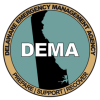The Atlantic States Marine Fisheries Commission and the Mid-Atlantic Fishery Management Council have prepared two very important documents that will have a serious impact on recreational fishing along the Delaware coast.
The first is the Striped Bass Draft Amendment 7 to the Interstate Fishery Management Plan for Atlantic Striped Bass. I printed out the Abbreviated Options Reference – it is 19 pages long. There are many options for everything from overfishing to a drop or increase in spawning stock biomass. Each option has a remedy for whatever the problem may be. Some of these include a non-targeting of striped bass for at least two weeks during certain times of the year when release mortality is highest. No targeting of striped bass during spawning seasons that can run from January through May. No targeting means you may not play catch-and-release or go after striped bass directly in any way. If you happen to catch one by accident, you must release it as quickly and as safely as possible.
The public hearing in Delaware took place Thursday, March 10, a day before this edition of the Cape Gazette came out. Fortunately, you can make written comments until 11:59 p.m., Friday, April 15. Send your emails to comments@asmfc.org. In the subject line, write Draft Amendment 7.
You can get a copy of the Abbreviated Options Reference at asmfc.org or by contacting Keep America Fishing for a copy and an easy way to make your comments. I suggest you spend some time reviewing this paper, then write your email telling the ASMFC what actions you believe they should take.
The next important document is the Recreational Harvest Control Rule Addenda/Framework. This is a joint effort between the Mid-Atlantic Fishery Management Council and the Atlantic States Marine Fisheries Commission. The objective is to provide greater stability and predictability in the recreational fishery management measures from year to year. The species covered will be summer flounder, black sea bass, scup and bluefish.
The system would set up options that would govern how regulations would correspond to changes to overall stock size, spawning stock biomass size, recruitment success or failure, and other measures. There are many factors involved in this process, and you really should read the six-page reference guide to become informed about what is at stake.
Delaware’s public hearing will be a webinar event from 6 to 8 p.m., Monday, March 28. Written comments will be accepted until Friday, April 22; email comments@asmfc.org with the subject line: Harvest Control Rule.
A copy of the six-page Recreational Harvest Control Rule Addenda/Framework is available at asmfc.org/files/PublicInput/hcr_DraftAddenda_PublicComment_March2022.pdf or via the commission’s public input webpage.
Paid parking at Roosevelt Inlet
I received an email from Mark Laubenstein, who was curious about the suggested parking meters at Roosevelt Inlet. He contacted Janelle Cornwell, Lewes planning and development officer, and asked why this was being considered. The reply was the idea came from the beach parking committee.
Right now, parking at the inlet is free and open. Folks can park there and fish the inlet or walk to the beach. While I never go into town on the weekends, I am sure the parking can get a bit crowded, and some sort of order is often required. Perhaps painting parking spaces would help, but putting in meters would only fill the town’s coffers and remove the only free and open access to Lewes Beach and Roosevelt Inlet.
Trout season
I did not get out fishing on the opening weekend of trout season. My son Ric came up from Virginia Beach to help his mother and me do some heavy yard work, and you can’t turn down that type of generosity.
The weather was pretty good for March, and I did get one good report.
There will be a restocking of both Tidbury Pond in Dover and Newton Pond in Greenwood during March. I hope to visit one or both before the New Castle County ponds open in April.
Fishing report
I wish I had better news as far as fishing goes, but the high winds and cold water have all but killed any thoughts of catching anything in the open bay or ocean. Even the charter boats that usually have solid bookings all winter out of Ocean City, Md., have canceled trips because the cold water has made the tog fishing very slow.
The only positive reports, other than the freshwater trout fishing, have been white perch from the upper reaches of the tidal creeks and rivers. Bloodworms, small minnows and earthworms have all produced perch. Yellow perch have been caught around Perryville, Md., on live minnows fished on a shad dart.
Those who fish certain Delaware ponds, such as Millsboro, find decent action with pickerel. Here, too, live minnows work best followed by spinners and spoons.






















































